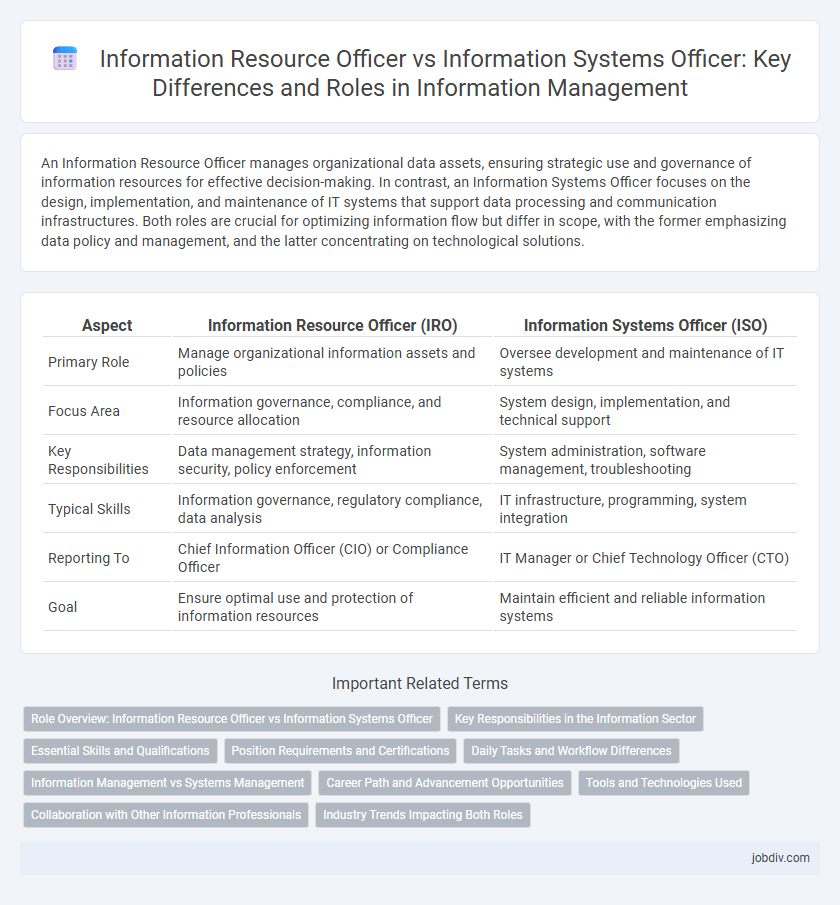An Information Resource Officer manages organizational data assets, ensuring strategic use and governance of information resources for effective decision-making. In contrast, an Information Systems Officer focuses on the design, implementation, and maintenance of IT systems that support data processing and communication infrastructures. Both roles are crucial for optimizing information flow but differ in scope, with the former emphasizing data policy and management, and the latter concentrating on technological solutions.
Table of Comparison
| Aspect | Information Resource Officer (IRO) | Information Systems Officer (ISO) |
|---|---|---|
| Primary Role | Manage organizational information assets and policies | Oversee development and maintenance of IT systems |
| Focus Area | Information governance, compliance, and resource allocation | System design, implementation, and technical support |
| Key Responsibilities | Data management strategy, information security, policy enforcement | System administration, software management, troubleshooting |
| Typical Skills | Information governance, regulatory compliance, data analysis | IT infrastructure, programming, system integration |
| Reporting To | Chief Information Officer (CIO) or Compliance Officer | IT Manager or Chief Technology Officer (CTO) |
| Goal | Ensure optimal use and protection of information resources | Maintain efficient and reliable information systems |
Role Overview: Information Resource Officer vs Information Systems Officer
An Information Resource Officer manages organizational data assets, focusing on data governance, classification, and accessibility to ensure information quality and compliance. An Information Systems Officer oversees the design, implementation, and maintenance of IT infrastructure and software applications to support operational efficiency and cybersecurity. Both roles are critical for optimizing information flow, with the Information Resource Officer emphasizing data management and the Information Systems Officer concentrating on technical system support.
Key Responsibilities in the Information Sector
Information Resource Officers manage the organization, classification, and dissemination of data to ensure accurate and secure access to information assets across departments. Information Systems Officers focus on the design, implementation, and maintenance of IT infrastructure, optimizing system performance and security to support organizational operations. Both roles are critical in maintaining data integrity and operational continuity within the information sector.
Essential Skills and Qualifications
Information Resource Officers require expertise in data management, metadata standards, and information governance to ensure effective resource organization and accessibility. Information Systems Officers must possess strong technical skills in network administration, cybersecurity, and system integration to maintain and secure IT infrastructure. Both roles prioritize analytical thinking, problem-solving abilities, and proficiency with relevant software tools for optimal information handling.
Position Requirements and Certifications
Information Resource Officers typically require a background in information management or library science, with certifications like Certified Information Professional (CIP) or Records Management Certification to demonstrate expertise in data governance and resource control. Information Systems Officers generally need a strong foundation in information technology or computer science, holding certifications such as CompTIA Security+, Certified Information Systems Security Professional (CISSP), or Microsoft Certified: Azure Administrator Associate to ensure proficient management of IT infrastructure and cybersecurity. Both positions demand strong analytical skills and familiarity with data privacy regulations, but their certifications and educational requirements reflect their distinct focus on information management versus technical systems administration.
Daily Tasks and Workflow Differences
Information Resource Officers primarily manage data governance, ensuring compliance with information policies and facilitating access to organizational knowledge bases, while Information Systems Officers focus on maintaining and optimizing IT infrastructure, including network security and system performance monitoring. Daily tasks for Information Resource Officers include overseeing document management systems, conducting data audits, and coordinating information-sharing protocols, contrasting with Information Systems Officers who handle system updates, troubleshoot technical issues, and implement cybersecurity measures. Workflow differences highlight that Information Resource Officers collaborate closely with compliance teams and end-users to align information usage with regulatory standards, whereas Information Systems Officers concentrate on technical support and infrastructure reliability to support seamless IT operations.
Information Management vs Systems Management
Information Resource Officers specialize in information management by overseeing data governance, ensuring data quality, and managing information lifecycle processes to support organizational knowledge assets. Information Systems Officers focus on systems management, handling the design, implementation, and maintenance of IT infrastructure and software applications that enable efficient information processing. Effective organizational performance depends on the collaboration of both roles, with Information Resource Officers optimizing data utility and Information Systems Officers ensuring system reliability and security.
Career Path and Advancement Opportunities
Information Resource Officers typically focus on managing organizational data assets, ensuring data governance, and compliance, with career paths leading to data management or compliance director roles. Information Systems Officers specialize in maintaining and optimizing IT infrastructure, progressing toward senior system architect or IT operations manager positions. Both careers offer advancement through certifications like PMP for project management or CISSP for cybersecurity, enhancing leadership opportunities in their respective domains.
Tools and Technologies Used
Information Resource Officers primarily utilize document management systems, knowledge repositories, and data governance tools to organize, classify, and manage organizational information assets effectively. Information Systems Officers focus on network infrastructure, cybersecurity tools, enterprise software platforms, and system monitoring technologies to design, maintain, and secure IT systems that support organizational operations. Both roles leverage cloud computing and collaboration tools, but IROs emphasize information accessibility and compliance, while ISOs concentrate on system performance and security.
Collaboration with Other Information Professionals
Information Resource Officers collaborate closely with librarians, data analysts, and archivists to ensure accurate classification, management, and accessibility of organizational information assets. Information Systems Officers work alongside network administrators, cybersecurity experts, and software developers to design, implement, and maintain secure and efficient information technology infrastructures. Both roles require continuous communication for aligning data governance strategies with technological systems to optimize overall information management and security.
Industry Trends Impacting Both Roles
Rapid advancements in cloud computing and cybersecurity are reshaping the responsibilities of both Information Resource Officers and Information Systems Officers. Data governance frameworks and regulatory compliance requirements increasingly influence their roles, necessitating expertise in risk management and data privacy. The growing integration of AI and machine learning technologies demands continuous adaptation to optimize information systems and resource management in dynamic industry environments.
Information Resource Officer vs Information Systems Officer Infographic

 jobdiv.com
jobdiv.com